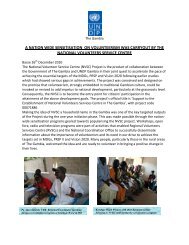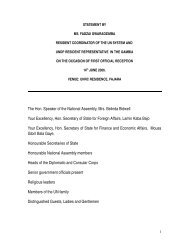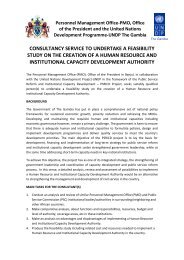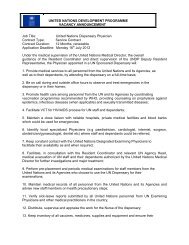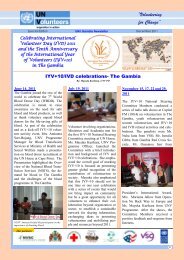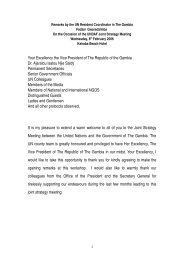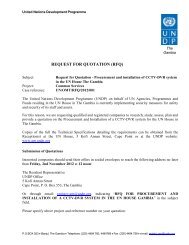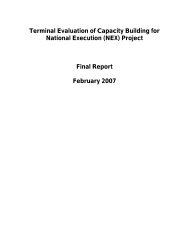Introduction - UNDP The Gambia
Introduction - UNDP The Gambia
Introduction - UNDP The Gambia
You also want an ePaper? Increase the reach of your titles
YUMPU automatically turns print PDFs into web optimized ePapers that Google loves.
________________________________________________________________________________________________________________________<br />
Furthermore, to effectively address the<br />
challenges in the public sector, the following<br />
measures should be employed:<br />
• A performance-based remuneration and<br />
promotion scheme (which has proved<br />
effective in some African countries,<br />
particularly Ghana and Uganda) should be<br />
introduced to enhance productivity and<br />
motivation.<br />
• To improve accountability, performance<br />
agreement contracts should be offered to<br />
selected senior officials to ensure efficient<br />
delivery of measurable outputs, within<br />
mutually determined periods.<br />
• A career development programme must<br />
be developed for all cadres to encourage<br />
development and the reward of acquired<br />
skills and competence.<br />
• <strong>The</strong> training function, which is largely uncoordinated<br />
and haphazard, should be<br />
more effectively planned and managed to<br />
ensure value for money. This process<br />
should be supported by strict and<br />
systematic enforcement of bonding<br />
schemes.<br />
• A comprehensive policy must be<br />
developed to ensure the effective<br />
utilisation of technical assistance<br />
personnel and the transfer of skills and<br />
competencies to national counterparts<br />
within a specific time frame.<br />
• Steps should be taken to ensure the<br />
revival of civil service associations for the<br />
enhancement of productivity, the<br />
resolution of grievances and the<br />
improvement of conditions of service.<br />
• <strong>The</strong> independence of the Public Service<br />
Commission should be safeguarded and<br />
unilateral dismissal of public servants,<br />
without adherence to established<br />
procedures and processes should be<br />
avoided. <strong>The</strong> civil service faces severe<br />
recruitment problems and a high turnover<br />
rate, resulting in a large number of<br />
unfilled positions, particularly at the<br />
middle management and professional<br />
levels. To address the problems of skill<br />
deficiencies and attrition, a<br />
comprehensive civil service assessment<br />
and reform study should be undertaken to,<br />
among other things determine skills<br />
shortages in the key areas, and to<br />
implement measures to minimise<br />
attrition.<br />
• <strong>The</strong> Personnel Management Office should<br />
conduct staff audits more regularly to<br />
ensure the full utilisation the of existing<br />
workforce.<br />
6.2 Private Sector<br />
<strong>The</strong> analysis on the private sector presented<br />
several issues, constraints and challenges that<br />
need to be addressed so that this sector can<br />
take a lead role in achieving the MDG and<br />
PRSP objectives to enhance human<br />
development. Despite national and<br />
international declarations for private sectorled<br />
economic growth and development,<br />
almost all funds for national capacity building<br />
programmes are directed to the public sector<br />
and little or none goes to, or can be accessed<br />
by, the private sector.<br />
<strong>The</strong> lack of direct funding for capacity<br />
building programmes in the private sector to<br />
stimulate growth and development is seen as<br />
a major issue and a constraint to the<br />
development of this important sector.<br />
<strong>The</strong> Report finds it ironical that the private<br />
sector in <strong>The</strong> <strong>Gambia</strong> is not fully aware of the<br />
existing MDGs and the PRSP, and therefore<br />
stresses the need for this sector to be aware of<br />
Government’s human development<br />
programmes. This lack of awareness by the<br />
private sector also probably reflects a lack of<br />
interest, as the sector may see the goals as<br />
socially oriented, with very little direct and<br />
immediate effects on its development.<br />
Private entrepreneurs are generally interested<br />
in ventures that bring quick financial results<br />
rather than investing in social goods.<br />
<strong>The</strong> analysis cites the low level of<br />
infrastructure development, including a<br />
decline in the growth of water and electricity<br />
supply, high cost of energy and poor road<br />
networks as major obstacles to private sector<br />
growth and development; these act as<br />
disincentives to potential investors. <strong>The</strong><br />
growth and development of the<br />
manufacturing and processing sector is also<br />
handicapped by the limited nature of the<br />
domestic market, shortage of skilled and<br />
________________________________________________________________________________________________<br />
Building Capacity for the Attainment of the Millennium Development Goals in <strong>The</strong> <strong>Gambia</strong> National Human Development Report 2005<br />
66



